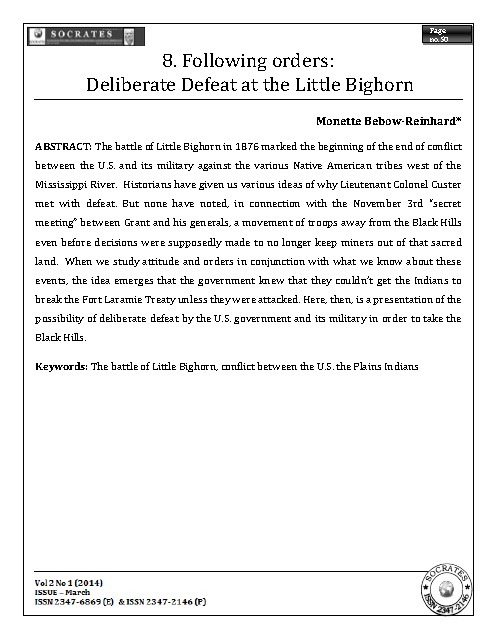Following orders
Deliberate Defeat at the Little Bighorn
Keywords:
The battle of Little Bighorn, conflict between the U.S. the Plains IndiansAbstract
The battle of Little Bighorn in 1876 marked the beginning of the end of conflict between the U.S. and its military against the various Native American tribes west of the Mississippi River. Historians have given us various ideas of why Lieutenant Colonel Custer met with defeat. But none have noted, in connection with the November 3rd “secret meeting” between Grant and his generals, a movement of troops away from the Black Hills even before decisions were supposedly made to no longer keep miners out of that sacred land. When we study attitude and orders in conjunction with what we know about these events, the idea emerges that the government knew that they couldn’t get the Indians to break the Fort Laramie Treaty unless they were attacked. Here, then, is a presentation of the possibility of deliberate defeat by the U.S. government and its military in order to take the Black Hills.
Downloads
Metrics
References

Downloads
Published
How to Cite
Issue
Section
License
Revised Copyright/CC license that applies to all the articles published after 05-02-2017
Attribution-NonCommercial 4.0 International (CC BY-NC 4.0)

Copyright/CC license that applies to all the articles published before 05-02-2017
Attribution-Non Commercial-No Derivatives 4.0 International (CC BY-NC-ND 4.0)

Author(s) will retain all the right except commercial and re-publishing rights. In the case of re-publishing, they will have to obtain written permission from the journal. Additional licensing agreements (Creative Commons licenses) grants rights to readers to copy, distribute, display and perform the work as long as you give the original author(s) credit, they can not use the works for commercial purposes and are not allowed to alter, transform, or build upon the work. For any reuse or distribution, readers and users must make clear to others the license terms of this work. Any of these conditions can be waived if you get permission from the copyright holders. Nothing in this license impairs or restricts the authors’ rights. To view a copy of this license, visit http://creativecommons.org/licenses/by-nc-nd/4.0/ or send a letter to Creative Commons, 171 Second Street, Suite 300, San Francisco, California, 94105, USA.
Research Papers published in SOCRATES are licensed under an Attribution-NonCommercial-NoDerivatives 4.0 International (CC BY-NC-ND 4.0)












